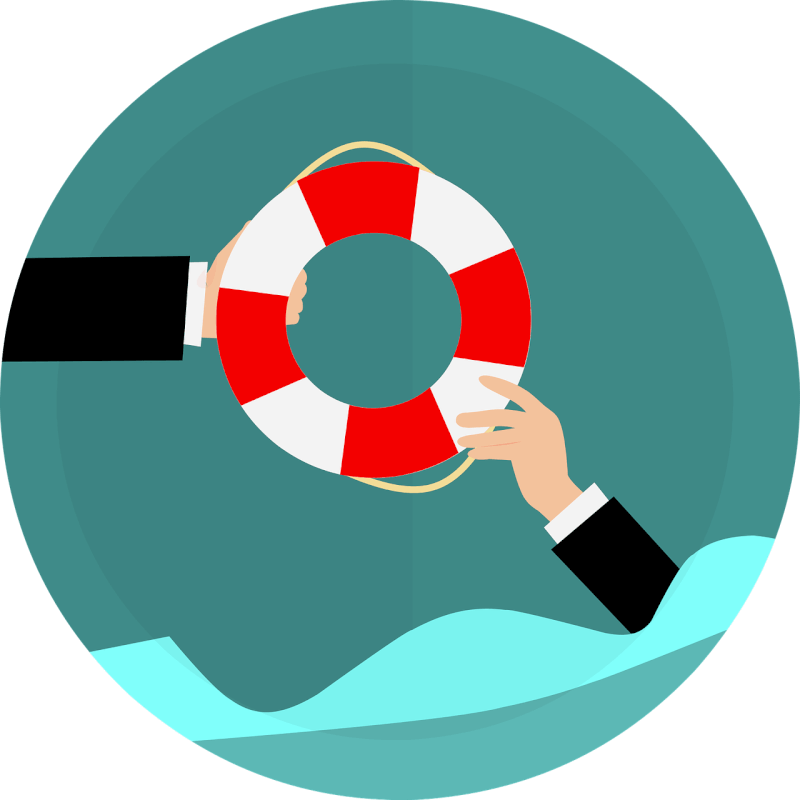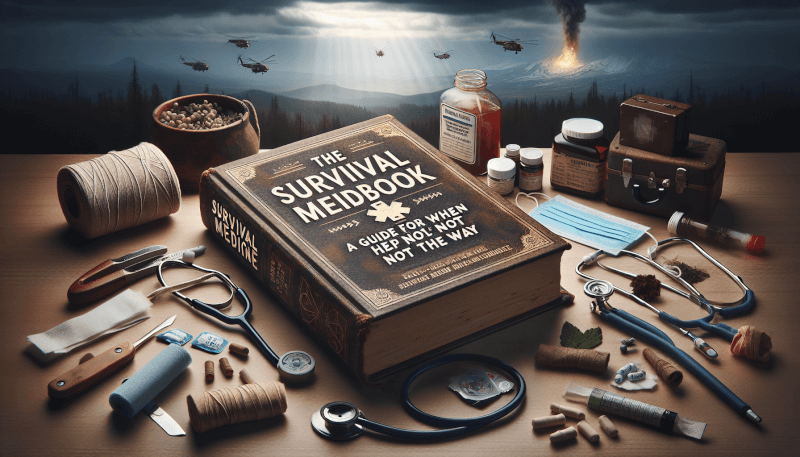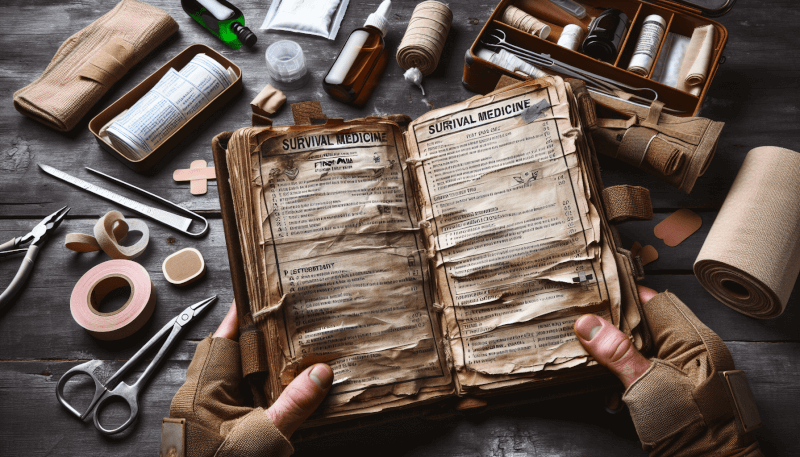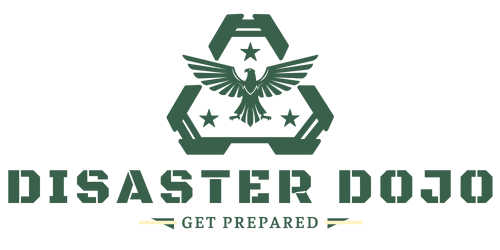Imagine you are in the midst of a crisis, isolated and with no medical help available. You’re faced with a daunting challenge – how will you take care of yourself and your loved ones? The Survival Medicine Handbook: A Guide For When Help Is Not On The Way comes to the rescue, providing you with invaluable knowledge and practical techniques to navigate through any medical emergency. Written in a friendly and accessible manner, this handbook equips you with the tools you need to become your own medic and confidently face any health-related adversity that may come your way.

1. Introduction
Overview of the importance of survival medicine
In an emergency situation where professional medical help is not available, having knowledge of survival medicine can mean the difference between life and death. Survival medicine is a crucial skill set that equips individuals to provide medical assistance and care when traditional healthcare systems are inaccessible or overwhelmed. It is a preventive approach that focuses on preparedness, resourcefulness, and self-sufficiency.
Understanding the need for self-sufficiency
When a disaster strikes or you find yourself in a survival situation, relying on external medical help may not be possible. Self-sufficiency becomes paramount as you may not have access to hospitals, doctors, or pharmacies. By understanding survival medicine, you can take control of your well-being, making informed decisions about your health, and providing necessary healthcare to yourself and others.
Challenges of seeking medical help in emergency situations
During emergency situations, seeking medical help can be challenging. Natural disasters, remote wilderness environments, or infectious disease outbreaks can restrict access to medical professionals and supplies. Time and distance can become significant barriers, making it difficult for medical assistance to reach you in time. Having the necessary knowledge and resources for survival medicine allows you to overcome these challenges and address medical needs effectively.
2. Assessing Medical Needs in a Survival Situation
Identifying common injuries and illnesses in survival scenarios
When facing survival scenarios, it’s essential to be aware of the common injuries and illnesses that can occur. These may include fractures, lacerations, burns, sprains, insect bites, allergic reactions, dehydration, and respiratory infections. By understanding the potential risks, you can better prepare for and address these medical needs.
Prioritizing medical needs based on severity
In a survival situation, it is crucial to prioritize medical needs based on severity. Life-threatening conditions, such as severe bleeding, compromised airways, or cardiac arrest, should be addressed first. Non-life-threatening injuries and illnesses can be managed subsequently. Understanding the urgency of medical needs helps allocate resources and attention effectively.
Determining available resources and limitations
Survival situations often come with limitations on resources. Assessing the available resources, such as first aid kits, medication supplies, and equipment, allows you to plan and strategize accordingly. Knowing your limitations and being resourceful are key to providing the best care possible with the resources at hand.
3. Essential Medical Supplies and Equipment
Creating a comprehensive first aid kit
A comprehensive first aid kit is an essential component of survival medicine. It should include items such as adhesive bandages, sterile gauze pads, antiseptic solution, medical tape, tweezers, scissors, a thermometer, disposable gloves, and over-the-counter pain relief medication. Additional supplies specific to your needs and potential risks should also be considered.
Understanding the purpose and usage of different supplies
Knowing how to use the different supplies in your first aid kit is crucial. Familiarize yourself with the purpose and proper usage of each item. For example, understanding how to clean and dress a wound using sterile gauze pads and antiseptic solution can prevent infections and promote healing. Knowing when and how to use pain relief medications can also provide comfort in difficult circumstances.
Securing and maintaining necessary equipment
Having access to necessary medical equipment can significantly enhance your ability to provide adequate care in a survival situation. This may include items such as a stethoscope, blood pressure cuff, splints, or a portable defibrillator, if possible. Ensure proper storage and maintenance of any equipment to ensure functionality when needed.
4. Basic Medical Skills for the Non-Medical Professional
Learning CPR and basic life-saving techniques
Cardiopulmonary Resuscitation (CPR) and basic life-saving techniques are vital skills for anyone involved in survival medicine. Learning how to perform chest compressions, rescue breathing, and recognizing signs of cardiac arrest or choking can significantly increase the chances of saving lives during emergencies. CPR certification courses or online tutorials can help acquire these crucial skills.
Administering common medications and treatments
While it is important to understand that administering medications and treatments generally falls under the purview of trained medical professionals, in survival situations, there may not be any alternative. Familiarize yourself with common over-the-counter medications, such as pain relievers, antihistamines, and anti-diarrheal medications, and learn how to administer them safely and effectively.
Addressing wound care and infection prevention
Proper wound care and infection prevention are vital aspects of survival medicine. Learning how to clean wounds, apply sterile dressings, and recognize signs of infection can help prevent complications, especially in situations where medical attention is unavailable. Basic knowledge of wound closure techniques, such as suturing or using butterfly closures, can also be valuable.

5. Dealing with Medical Emergencies in Isolation
Assessing and stabilizing critical injuries
In isolated survival situations, it is essential to be able to assess and stabilize critical injuries. By utilizing the knowledge of survival medicine, you can determine the severity of an injury, control bleeding, immobilize fractures, and manage shock until professional help becomes available or transportation to a healthcare facility is possible.
Managing acute illnesses without professional help
Infections, respiratory illnesses, and other acute medical conditions can occur in survival scenarios. Understanding common symptoms, providing palliative care, and having a basic understanding of medications and treatments can help manage these acute illnesses until medical support can be obtained.
Making informed decisions in life-threatening situations
Survival situations may occasionally present life-threatening emergencies where immediate decisions need to be made. By learning survival medicine, you can assess the situation, weigh the risks, and make informed decisions that prioritize the health and safety of yourself and others. Knowing when and how to initiate emergency medical procedures can be crucial in these high-pressure situations.
6. Natural Remedies and Alternative Medicine
Exploring the use of herbal remedies and essential oils
In survival situations, natural remedies and essential oils may be utilized as alternative medicines when traditional options are not available. The use of herbs such as aloe vera for burns or lavender for stress relief can offer some comfort and aid in healing. However, it is important to recognize the limitations and potential risks associated with these remedies and consult reliable sources for guidance.
Understanding the benefits and limitations of alternative therapies
While alternative therapies, such as acupuncture or chiropractic techniques, may offer potential benefits, it is vital to understand their limitations and safety considerations. In survival settings, alternative therapies can provide temporary relief for certain conditions, but they should not replace necessary medical treatments. Always prioritize evidence-based approaches and seek professional help when possible.
Creating a natural medicine cabinet for survival situations
Building a natural medicine cabinet with herbal remedies, essential oils, and other alternative medicines can be a valuable addition to your survival supplies. Having items such as tea tree oil for disinfection, ginger for digestive issues, or peppermint oil for headaches can provide comfort and aid self-care in challenging circumstances. However, it is important to research and understand the proper usage and potential side effects of these remedies.

7. Mental Health and Emotional Well-being in Survival
Recognizing and managing psychological stress
Survival situations can be mentally and emotionally challenging. Recognizing the signs of psychological stress, such as anxiety or depression, and understanding coping mechanisms is crucial. Implementing stress management techniques, maintaining a routine, engaging in physical activities, and promoting social support within the group can help maintain mental well-being during prolonged survival situations.
Coping strategies for long-term survival scenarios
Long-term survival scenarios require individuals to adapt and cope with ongoing challenges. Establishing a sense of purpose, setting realistic goals, practicing mindfulness and meditation, fostering creativity, and maintaining a positive mindset can contribute to resilience and well-being during extended periods of isolation and uncertainty.
Providing psychological support to others
Being aware of the emotional well-being of others in your group is equally important in survival situations. Offering a listening ear, providing words of encouragement, and engaging in activities that foster a sense of community can be instrumental in supporting the mental health of others. Open communication and the provision of psychological support contribute to a more cohesive and resilient group dynamic.
8. Medical Preparedness for Specific Survival Scenarios
Surviving natural disasters
Natural disasters, such as earthquakes, hurricanes, or floods, can create unique medical challenges. Understanding the potential injuries and illnesses associated with specific disasters can help you prepare appropriately. For example, learning about the management of crush injuries or waterborne illnesses can be important in regions prone to earthquakes or floods. Tailor your survival medical preparedness to the specific risks you may face.
Handling medical emergencies in remote wilderness
Outdoor enthusiasts and adventurers may find themselves in remote wilderness locations where access to medical help is limited. Knowledge of wilderness first aid and survival medicine is vital in preventing and managing injuries such as hypothermia, dehydration, snake bites, or fractures. Include specialized equipment, such as a field suture kit or water purification tablets, in your survival kit.
Preparing for pandemics and infectious disease outbreaks
Infectious disease outbreaks can quickly overwhelm healthcare systems and disrupt access to medical help. Being prepared with knowledge and resources to manage potential pandemics, such as hand hygiene, isolation protocols, and personal protective equipment, can reduce the risk of transmission and aid in the containment of infectious diseases. Stay informed about the latest guidelines and recommendations from reputable health organizations.

9. Hygiene and Sanitation Practices
Maintaining cleanliness and preventing infections
Good hygiene practices are essential in preventing infections, especially in resource-limited environments. Regular handwashing with soap and water, maintaining personal cleanliness, and promoting proper sanitation practices, such as disposing of waste responsibly, are vital in reducing the risk of infectious diseases. In survival situations, prioritize hygiene and cleanliness to protect yourself and others.
Proper waste disposal in resource-limited environments
Disposing of waste properly is critical in survival situations, especially when access to sanitation facilities is limited. Understand safe waste disposal practices, such as burying human waste, using biodegradable soaps, and minimizing environmental contamination. Maintaining a clean and sanitary environment is crucial for the health and well-being of your group.
Importance of personal hygiene in survival
Personal hygiene plays a significant role in maintaining health and preventing diseases. Regular bathing, teeth brushing, and clean clothing can help prevent infections and promote well-being. Prioritizing personal hygiene in survival situations may require resourcefulness, such as using improvised methods when traditional means are unavailable, but it remains an essential aspect of survival medicine.
10. Establishing a Network and Communication
Building a team of medical and non-medical personnel
In survival situations, collaboration and teamwork are vital. Build a diverse team comprising individuals with medical knowledge and non-medical skills. Assign roles and responsibilities to ensure efficient distribution of tasks. This team-based approach allows for optimal utilization of skills and resources, enhancing the overall effectiveness of survival medicine.
Establishing communication channels in survival situations
Communication is essential during emergencies. Establish reliable communication channels within your group, utilizing tools such as two-way radios, satellite phones, or signal mirrors. Test and practice communication methods to ensure they work effectively when needed. Regular check-ins and updates can help maintain situational awareness and coordinate medical efforts.
Coordinating medical efforts among group members
Having a designated leader or medical coordinator within your group facilitates the coordination of medical efforts. This individual can oversee the availability and allocation of medical supplies, manage the triage of patients, coordinate emergency response plans, and update the group on medical procedures and protocols. Effective coordination ensures that medical needs are addressed systematically and efficiently.
Survival medicine is a valuable skillset that empowers individuals to provide essential medical care in emergency situations. Understanding the importance of self-sufficiency, assessing medical needs, learning basic medical skills, and preparing for specific survival scenarios are all key elements of survival medicine. By promoting hygiene, addressing mental health, and establishing communication networks, individuals can enhance their readiness and resilience in the face of adversity. The Survival Medicine Handbook serves as a comprehensive guide, equipping individuals with the knowledge and resources needed when professional medical help is not readily available.



